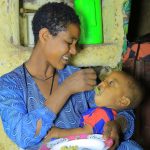Age-appropriate breastfeeding and introduction to complementary foods can shape child feeding practices, ensure adequate energy and nutrient intake and prevent linear growth faltering. This study aimed to assess mothers' and health workers' knowledge of timely introduction to complementary foods and evaluate the relationship between delays in complementary feeding and subsequent linear growth. We conducted two rounds of surveys (March/August 2017) among 249 health workers (n = 249) and caregivers (n = 2635) of children 6–23 months of age. We collected information about socio-demographic characteristics, knowledge and practice related to timely introduction to complementary foods. The study was conducted in households from the Productive Safety Net Programme (PSNP) districts, in four highland regions of Ethiopia. Delays in the introduction to complementary feeding were widespread with 53% of children 6–8 months of age not consuming solid, semisolid or soft foods in the past 24 h. After controlling for child, caregiver and household characteristics, children not introduced to complementary foods by 6–8 months had a 0.48 SD lower length-for-age z-score at 12–15 months. Caregivers' knowledge was strongly and inversely correlated with untimely introduction of complementary foods in logistic regressions (OR = 0.55, p < 0.01). In turn, local health extension worker's knowledge was strongly correlated with caregiver's knowledge. Consequently, frequent and timely visits by health extension workers emphasising not only on what to feed but also when and how to feed a child are needed. Innovative ways of increasing reach, intensity and frequency of nutrition messaging by using the PSNP interactions as an additional point of contact would need to be explored further. Read more.
